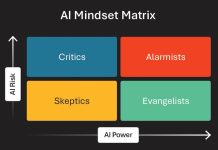There’s a quiet shift unfolding across sales organizations. As agentic AI moves from experimentation to execution, we’re seeing the start of a new operational model — one where we stop buying software and start investing in digital labor.
For decades, software in sales meant tools layered on top of manual workflows. Today, AI agents can write summaries, recommend next steps, score leads and even guide conversations in real time. Leaders increasingly recognize that seizing AI’s potential means rethinking traditional sales roles and workflows at a foundational level.
Why Sales Is Ground Zero for AI Transformation
Gartner forecasts that by 2027, 95% of seller research workflows will begin with AI, up from less than 20% in 2024. That shift is already underway: Salesforce reported in June 2025 that 78% of organizations are using AI agents to fully automate entire workstreams, and 72% believe their infrastructure is ready to scale AI adoption.
According to Microsoft’s 2025 Work Trend Index, “2025 will be remembered as the year the Frontier Firm was born — the moment companies moved beyond experimenting with AI and began rebuilding around it.” These “Frontier Firms” are restructuring their operations with “intelligence on tap,” designing systems in which AI plays an integral role across functions.
A New Sales Org Model: From Reps to GTM Engineers
Truly harnessing AI’s power often requires a structural shake-up in the sales organization. Rather than layering AI on top of siloed roles, some pioneers are redesigning roles altogether. For example, one AI-native firm, Clay, reported in a blog post that “the sales floor of tomorrow won’t resemble today’s reality of AEs, SDRs and RevOps manually crafting emails and cold calls. Instead, it will look more like an engineering organization.
In practice, this means treating sales workflows as scalable systems rather than individual efforts. In this vision, sales teams will build automated systems that can reach thousands of prospects without adding headcount.” Sellers become more like technical problem-solvers — designing automation workflows, orchestrating data pipelines and optimizing processes — much like engineers, if enabled with the right agentic and generative AI capabilities.
The payoff is a more efficient organization that can generate pipeline, engage customers and drive revenue with far fewer handoffs. While every company may not adopt the exact “GTM engineer” model, the underlying principle holds: strategic AI bets go hand in hand with restructured teams and workflows. Firms that eliminate redundant steps and empower salespeople to act as builders of scalable outreach systems can achieve outsized results with leaner teams.
Building the “Agent Boss” Culture
Microsoft describes this transition as the rise of the “Agent Boss” — employees who manage, train and collaborate with AI agents to achieve outcomes. The future sales org will likely consist of human and agent combination teams blending human judgment with AI speed. This means that staff must be upskilled to work alongside AI. Companies are investing in AI training so employees at all levels can become adept copilots.
Of course, this eliminates the common concern, “is AI replacing my job?” Rather than replacing salespeople, AI is elevating their role to focus on strategic activities like building relationships, crafting creative solutions, and guiding the AI on intent and tone.
As much as this shift requires sellers to learn new skills, revenue engine leaders (CSOs, CROs, and even CMOs) are the ones to lead the cultural and organizational change. That includes defining new success metrics, designing workflows agents can own, and ensuring internal trust in digital labor before extending it to customers.
A Strategic Imperative
For revenue leaders, the challenge isn’t whether to adopt AI, but how to redesign their processes around it. That means redefining value around outcomes, not features; investing in AI-first workflows; and enabling teams to scale insight and performance through collaboration with agents.
The winners in this new era won’t be those who add the most features, but the change agents (pun intended) who design the smartest systems and empower the most adaptive teams while fully embracing agents as their team of digital workers.
The future of sales is about doing less and achieving more with AI agents by your side.




